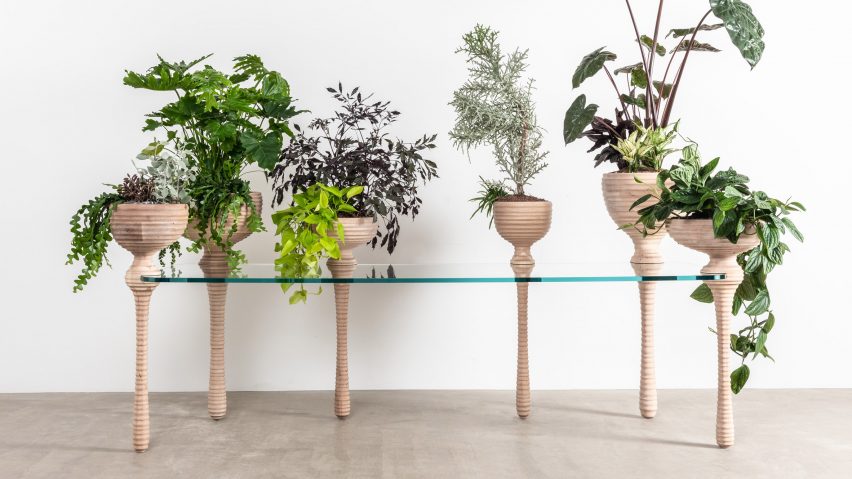Sculptural maple planters form the legs of a modular desk designed by Heatherwick Studio as part of the Design Museum's Connected: Made Together, Apart project at London Design Festival.
Called Stem, the system is made up of six legs of different heights and diameters, which can be combined and clamped onto a desk surface to prop it up.
"We thought, what if we designed in effect clamps that are a system of legs, that you can apply to any surface you think you'd like to work at, whether it's a door or an IKEA tabletop or a piece of stone," explained the studio's founder Thomas Heatherwick.
"And then you take the same stem that holds up that surface and allow that to extend and contain a substantial piece of nature," he told Dezeen.
Heatherwick, who designed the desk during coronavirus lockdown, incorporated living plants into the design to create a desk that aligned with the ideals of Attention Restoration Theory, which was developed by psychologists Rachel and Stephen Kaplan in the 1980s.
"It proposes that exposure to natural environments for 40 seconds or so really has very tangible improvements to brain functioning and to help your mind recover and replenish in-between periods of concentration," said Heatherwick.
"I usually have the luxury of moving around between teams and people and places. And that means that there is a certain kind of mental response that is elicited by variety and textures and differences during the day," he continued.
"I've certainly not sat down for so long since I was a teenager doing exams, so to have spent those months in lockdown London, the environment you're in seems to take on new relevance."
Despite the emphasis on emotional wellbeing, the design also remains extremely functional, with the possibility to run electrical wiring through the legs and use the vessel as a storage tray or the base for a light.
In order to make the design as accessible as possible, attaching the legs does not require any specialist equipment.
Once the tabletop is slid into a designated groove, grub screws can simply be tightened from below with an Allen key to secure it in place.
The design was created as part of the Connected project, which was organised by the Design Museum in collaboration with the American Hardwood Export Council (AHEC).
It challenged nine international designers including Heatherwick Studio, Ini Archibong and Sabine Marcelis, to design a wooden desk set up that "suits their new ways of working from and living at home".
All nine pieces were created in collaboration with the carpenters of English furniture maker Benchmark.
Heatherwick worked with the team via emails and video calls to CNC mill a tactile ripple pattern into the maple wood legs.
Drawing on the craft of wooden spoon carving, each leg is turned into a sculptural piece in its own right.
"You can buy one of them or 10 of them and it can hold up whatever surface works for you," said Heatherwick.
"We've used glass in order to throw the emphasis onto these legs and the plants as much as possible. That's also we chose maple wood because of it's beautiful, humble lightness."
The version of Stem that will be on display during London Design Festival holds ten different plants of all different species, including two cactuses, a Monstera and African Jasmine.
"We spent quite a lot of time choosing them in order to get a feeling of variety," said Heatherwick.
"The workplace is so often a very monotonous environment so we wanted some of the qualities that you might get in garden design, which involves a layering of different types of colouration rather than just a generic, happy green."
The project represents the latest in a series of biophilic design project from Heatherwick Studio, that hope to introduce elements of nature into manmade environments in order to improve the mental and physical wellbeing of its inhabitants.
Most recently, the studio designed a plant- and timber-filled cancer care centre for British charity Maggie's while a mixed-use development in Shanghai, which is covered in 1,000 trees is nearing completion in Shanghai.
"However good you think you are as a designer there needs to be a break from you," said Heatherwick.
"There might be an idea that you think is nice for a facade. But if that carries on and carries on for half a kilometre, it loses its humanity through monotony, repetition and sterility. Nature seems to provide that counterpoint that is not designed while actually helping us to appreciate the bits that are."

